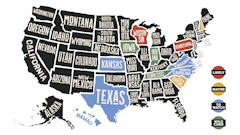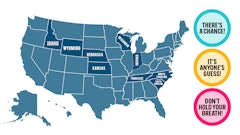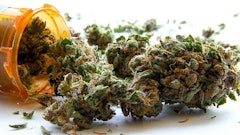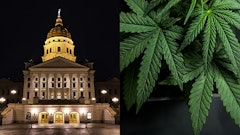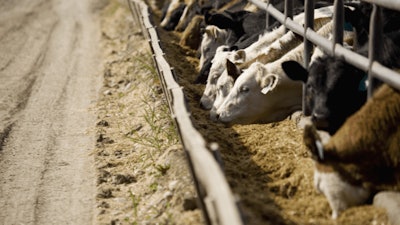
A recent study conducted by researchers within the Kansas State University (KSU) College of Veterinary Medicine found that feeding industrial hemp with high cannabidiolic acid (CBDA) content to Holstein steers, a breed of dairy cattle, may reduce stress and inflammation.
According to the study, recently published in Nature, one of the main goals of the research was to "investigate the plasma concentrations of cannabinoids in cattle following daily dosing, and the effects of cannabinoids on activity and blood inflammatory and stress biomarkers."
The study included 16 castrated Holstein steers equally divided into two treatment groups: cattle fed industrial hemp and a control group fed grain.
The study states that the eight cattle in the hemp group were fed "25g of [industrial hemp] mixed in 200g of grain once a day for 14 days to target a daily dose of 5.5 mg/kg of CBDA."
And the eight cattle in the control group were fed 200g of grain for 14 days, says Michael Kleinhenz, Ph.D. assistant professor in the College of Veterinary Medicine at KSU.
Study Findings
Kleinhenz says the most prominent findings from the study were that the cattle fed hemp for 14 days experienced a decrease in stress biomarkers and an increase in lying time.
"Those were the two big things that went hand-in-hand together," he says. "These animals seemed to be more relaxed and laid down more, and that was supported by lower cortisol concentrations."
He says there are specific periods in a cattle’s life that can increase stress and inflammation, specifically noting weaning and transportation periods.
"When calves are weaning from their mother, … that's a big stress for the [calves]," he says. "The second one that occurs very frequently is transportation. Almost all cattle are moved at some point in their life from one farm to another place. So those are two big stressors we know of, [where] we wanted to basically use industrial hemp potentially in those situations to reduce stress."
Aside from the reduced stress and increased lying time, the dataset also showed a safety element, he says.
"We also included biomarkers and blood parameters for liver and kidney injury, mostly liver injury, so we were able to show with that dataset that cattle were fed industrial hemp for 14 days … [didn’t have] any differences in liver enzymes or anything like that," he says. "So, it doesn't appear that [feeding hemp with CBDA to cattle] causes any sort of hepatotoxicity."
He says KSU researchers received a $200,000 Agriculture and Food Research Initiative Competitive Grant from the USDA National Institute of Food and Agriculture in 2020 to explore the effects of feeding cattle hemp.
"So, the USDA actually went ahead and funded this line of work. And part of it was to figure out where industrial hemp could be used in animal feed, exposures to cannabinoids, when is it safe for those to enter the food chain, and [to] basically start to build up some of this data for other researchers to have," he says.
More Research to Come
Kleinhenz notes that research like this is essential for the FDA and AAFCO–who recently called for more research on the topic—to consider hemp and its byproducts to be used in animal feed, adding that he and his colleagues have similar studies already in the works or coming soon.
"This study was a precursor to a final study [we] just completed where we fed industrial hemp [to cattle] for 14 days, and at the end of that 14 days, we euthanized and harvested those cattle so we can have an idea of where cannabinoids go in the body ... because the FDA really doesn't find it favorable to have cannabinoids in meat and milk without the consumer knowing," he says.
He and his colleagues also recently wrapped up a transportation study, and they have a second one planned for some time this year. "We are also going to work on determining the transference of cannabinoids into the milk," he says. "So, we are going to feed industrial hemp to some lactating dairy cows, harvest that milk, and see how much cannabinoids actually enter into the milk."
"We have some internal funding from our college here for some of our pilot work for transportation," he says, adding that they are hoping to get other USDA grants in the future.













